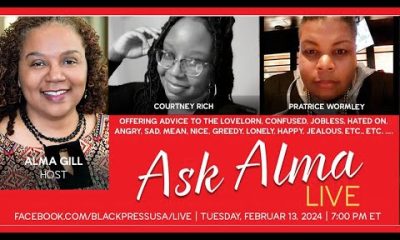Commentary
COMMENTARY: Spoiler Culture; What is Wrong with You?
HOUSTON FORWARD TIMES — It varies between movies, television series, and even surprises on musical projects. It appears that no one is safe from spoilers. Stay off social media, they said. Fine. Cool. Then, of course, I innocently turn on a podcast to distract myself from the heinous traffic situation in Houston only to have one of the hosts casually throw in a major spoiler to a film I’d yet to see in a segment UNRELATED TO THE TOPIC AT HAND
I now understand why superior beings from more advanced galaxies and various dimensions won’t communicate with us lowly humans. It’s because we are simply the worst. How are we the worst, you ask? Well, a singular aspect of popular “garbage-dom” is people’s incessant propensity to spoil plot twists and important details of entertainment.
It varies between movies, television series, and even surprises on musical projects. It appears that no one is safe from spoilers. Stay off social media, they said. Fine. Cool. Then, of course, I innocently turn on a podcast to distract myself from the heinous traffic situation in Houston only to have one of the hosts casually throw in a major spoiler to a film I’d yet to see in a segment UNRELATED TO THE TOPIC AT HAND. Wow. Great. Thanks. That’s my fault, I guess…because I already knew people will find a way to let you down.
I have experienced spoilers in many forms. There is, of course, the coworker whose social interactions are limited to the work-space so they blurt out major spoilers once they hear anyone in the “office” (I use that term loosely, we don’t all work in an office) has begun watching something they’ve watched. There is the person who gets a kick out of provoking other people so they throw their spoiler in with a bunch of other unwanted predictions to pretend like they aren’t spoiling anything. There is the individual who has no self-awareness and as soon as they hear the title they say what happens in the end. I’ve even experienced a person screaming out the ending to the film in a movie theater full of people as the film was playing. Trash behavior.
The way we consume entertainment has certainly evolved over the years. With the rise of on-demand streaming services, the availability and immediacy of the entertainment we consume is like nothing we’ve seen before. I feel like we’re a decade away from having films and videos uploaded into our brains. The other thing that has added fuel to the fire is social media, which, inadvertently, has given everyone a voice. What happened is that in an effort to participate in this virtual community, people are using their newfound “voice” even though no one truly has anything to say. That’s why it has become an echo-chamber of the same memes and jokes and spoilers and rinse and repeat.
I didn’t grow up wealthy or anything like that so going to the movies was rare and a treat. We didn’t have cable so I wasn’t able to participate in watching a lot of the shows of the day. I still managed to get around to watching things on my own time, unspoiled. That is the truth. Things are different for me now. I am able get to the theater more often and stream the shows that are important to me. I check my own privilege and I am mindful that everyone’s priorities and money situations are different and should be respected. Instead of spoiling things for other people, I simply suggest they check it out for themselves when and if they get the chance. I am happy when I am able to direct someone towards some form of entertainment that brings them joy.
There is a new trend now though…it’s a trend of shaming people who haven’t had an opportunity to see the latest movie, or catch the most recent episode of a show. What’s worse is the people that are doing the shaming are completely unapologetic, which is just pathetic.
Here’s a suggestion. Instead of ruining things for the people coming behind you, how about you let people enjoy things, in their own time, and go find you some brand new business. Deal?
This article originally appeared in the Houston Forward Times.
Commentary
Opinion: Lessons for Current Student Protesters From a San Francisco State Strike Veteran
How the nation’s first College of Ethnic studies came about, bringing together Latino, African American and Asian American disciplines may offer some clues as to how to ease the current turmoil on American college campuses over the Israel-Hamas war. After the deadline passed to end the Columbia University encampment by 2 p.m. Monday, student protesters blockaded and occupied Hamilton Hall in a symbolic move early Tuesday morning. Protesters did the same in 1968.

By Emil Guillermo
How the nation’s first College of Ethnic studies came about, bringing together Latino, African American and Asian American disciplines may offer some clues as to how to ease the current turmoil on American college campuses over the Israel-Hamas war.
After the deadline passed to end the Columbia University encampment by 2 p.m. Monday, student protesters blockaded and occupied Hamilton Hall in a symbolic move early Tuesday morning.
Protesters did the same in 1968.
That made me think of San Francisco State University, 1968.
The news was filled with call backs to practically every student protest in the past six decades as arrests mounted into hundreds on nearly two dozen campuses around the country.
In 1970, the protests at Kent State were over the Vietnam War. Ohio National Guardsmen came in, opened fire, and killed four students.
Less than two weeks later that year, civil rights activists outside a dormitory at Jackson State were confronted by armed police. Two African American students were killed, twelve injured.
But again, I didn’t hear anyone mention San Francisco State University, 1968.
That protest addressed all the issues of the day and more. The student strike at SFSU was against the Vietnam war.
That final goal was eventually achieved, but there was violence, sparked mostly by “outside agitators,” who were confronted by police.
“People used the term ‘off the pigs’ but it was more rally rhetoric than a call to action (to actually kill police),” said Daniel Phil Gonzales, who was one of the strikers in 1968.
Gonzales, known as the go-to resource among Filipino American scholars for decades, went on to teach at what was the positive outcome of the strike, San Francisco State University’s College of Ethnic Studies. It’s believed to be the first of its kind in the nation. Gonzales recently retired after more than 50 years as professor.
As for today’s protests, Gonzales is dismayed that the students have constantly dealt with charges of antisemitism.
“It stymies conversation and encourages further polarization and the possibility of violent confrontation,” he said. “You’re going to be labeled pro-Hamas or pro-terrorist.”
That’s happening now. But we forget we are dealing not with Hamas proxies. We are dealing with students.
Gonzales said that was a key lesson at SF State’s strike. The main coalition driving the strike was aided by self-policing from inside of the movement. “That’s very difficult to maintain. Once you start this kind of activity, you don’t know who’s going to join,” he said.
Gonzales believes that in the current situation, there is a patch of humanity, common ground, where one can be both pro-Palestine and pro-Israel. He said it’s made difficult if you stand against the belligerent policies of Benjamin Netanyahu. In that case, you’re likely to be labeled antisemitic.
Despite that, Gonzales is in solidarity with the protesters and the people of Gaza, generally. Not Hamas. And he sees how most of the young people protesting are in shock at what he called the “duration of the absolute inhumane kind of persecution and prosecution of the Palestinians carried out by the Israeli government.”
As a survivor of campus protest decades ago, Gonzales offered some advice to the student protesters of 2024.
“You have to have a definable goal, but right now the path to that goal is unclear,” he said.
About the Author
Emil Guillermo is a journalist and commentator. A veteran newsman in TV and print, he is a former host of NPR’s “All Things Considered.”
Activism
Oakland Post: Week of May 1 – 7, 2024
The printed Weekly Edition of the Oakland Post: Week of May 1 – 7, 2024

To enlarge your view of this issue, use the slider, magnifying glass icon or full page icon in the lower right corner of the browser window. ![]()
Activism
Oakland Post: Week of April 24 – 30, 2024
The printed Weekly Edition of the Oakland Post: Week of April 24 – 30, 2024

To enlarge your view of this issue, use the slider, magnifying glass icon or full page icon in the lower right corner of the browser window. ![]()
-

 Community3 weeks ago
Community3 weeks agoFinancial Assistance Bill for Descendants of Enslaved Persons to Help Them Purchase, Own, or Maintain a Home
-

 Business3 weeks ago
Business3 weeks agoV.P. Kamala Harris: Americans With Criminal Records Will Soon Be Eligible for SBA Loans
-

 Activism4 weeks ago
Activism4 weeks agoOakland Post: Week of April 10 – 16, 2024
-

 Community3 weeks ago
Community3 weeks agoAG Bonta Says Oakland School Leaders Should Comply with State Laws to Avoid ‘Disparate Harm’ When Closing or Merging Schools
-

 Activism2 weeks ago
Activism2 weeks agoOakland Post: Week of April 24 – 30, 2024
-

 Community2 weeks ago
Community2 weeks agoRichmond Nonprofit Helps Ex-Felons Get Back on Their Feet
-

 Community2 weeks ago
Community2 weeks agoOakland WNBA Player to be Inducted Into Hall of Fame
-

 Community2 weeks ago
Community2 weeks agoRPAL to Rename Technology Center for Retired Police Captain Arthur Lee Johnson




















































